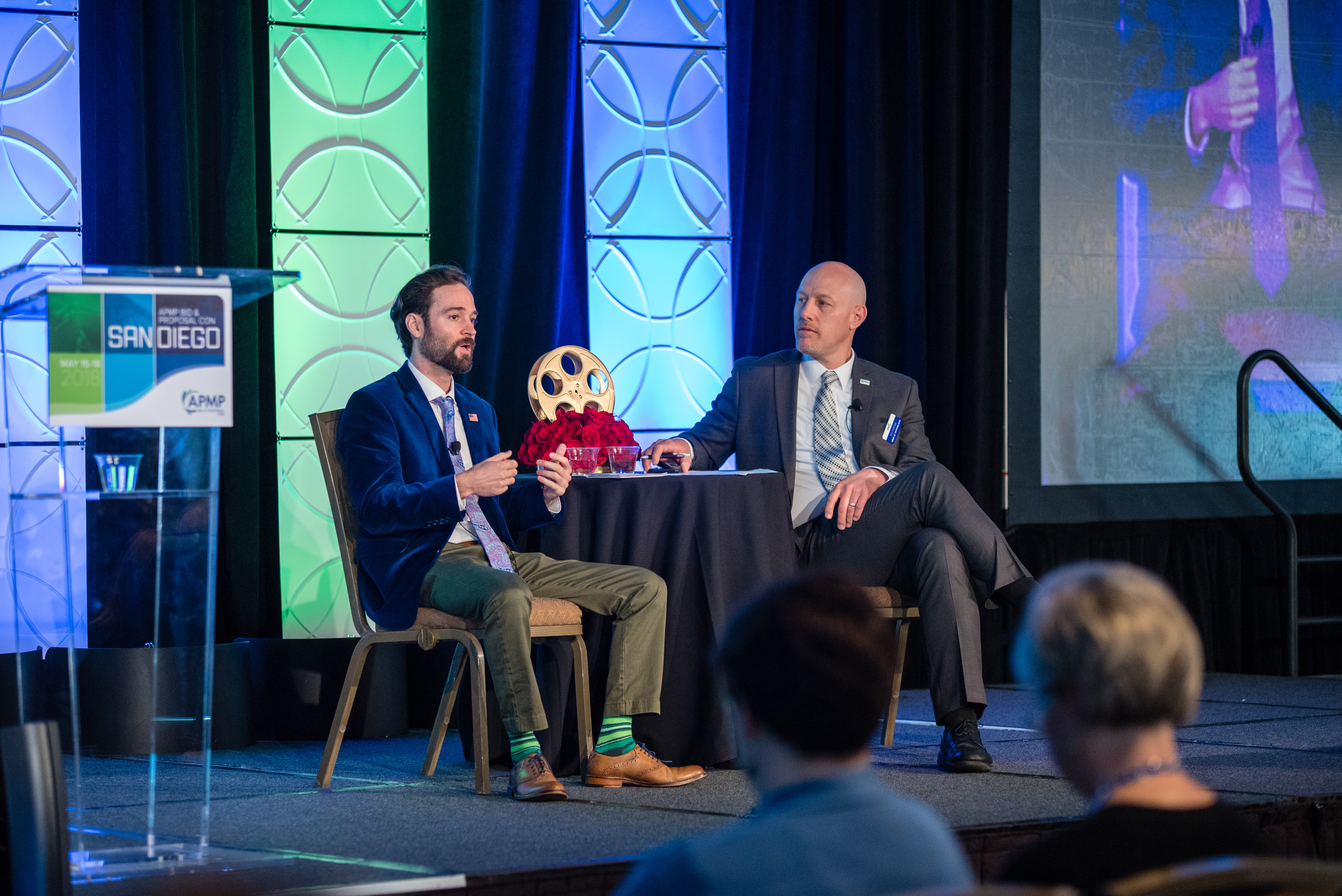On May 17, at Bid & Proposal Con 2018, APMP Chair Jamie Ninneman sat down for a fireside chat with keynote speaker Christoph Mlinarchik.
Ninneman began by asking Mlinarchik, beyond the industry classics, what he reads that helps him in his job. Mlinarchik expressed an interest in nonfiction, especially on the topics of human psychology, cognitive biases, and behavioral economics. A few recent titles included:
- The Art of Thinking Clearly
- Thinking Fast and Slow
- Influence: The Psychology of Persuasion
Humans are evolved to make decisions on the fly with limited information, Mlinarchik said, and he was interested in learning more about human thought processes. If a bid is good and compliant, checks all the boxes, but doesn’t win, the tendency is to think something must be wrong with the proposal, but it may have come down to other factors instead like client interaction, gathering intelligence, etc.
Acquisition reform is a constantly moving target, and Mlinarchik next talked about some of the changes there. “Category management” is another term for “strategic sourcing,” which is another term for “consolidation,” which basically comes down to using fewer contractors to spend money faster, he said. With fewer contracts to compete for, companies will need to change their thinking of how to get involved in government acquisitions. He explained that the former Acquisition, Technology, and Logistics Department at the U.S. Pentagon has been split into two departments, including one called Research and Engineering. This new department is focused on getting the best innovative technology, the best research and developing, and on taking risks. Mlinarchik says government spending is moving away from complicated source selection and moving to more to the commercial sector to bring in new clients. Mlinarchik sees particular growth in the areas of cybersecurity, information technology, and cloud services. The government is concerned with updating their security, which will also spur more growth in the private sector as well.
Ninneman opened the floor to audience questions, the first of which was about the FAR 15 (Federal Acquisition Regulation). Mlinarchik explained that the FAR 15 is cumbersome, slow, doesn’t match how business is done in the private sector, and is a big problem is negotiations process. While the FAR isn’t going away, reform-minded political appointees are moving away from it. As a follow-up, the next question was about the OTA (Other Transaction Authority), which Mlinarchik explains is the foil to the FAR. The OTA is a way for the federal government to conduct business the same way the private sector does and is an open way of crafting a contract. Agencies like the Defense Advanced Research Projects Agency, the Department of Defense, Department of Homeland Security, and NASA can use it to get innovative solutions, research and development, prototype projects, etc.
Mlinarchik does see that there will continue to be a distinction between the federal and the private sector. The government is subject to regulations because they’re spending taxpayers’ money. But the intent of reform-minded people is to emphasis commercial buying using commercial procedures within the government, which includes moving away from FAR 15 and moving toward the e-commerce portal (which used to be called the Amazon amendment; this is ensconced in legislation and the General Services Administration is preparing to roll it out).
Client relationships are just as important in the federal sector, said Mlinarchik, because it’s important to understand what a particular agency is buying and what keeps people up at night, what the incumbent is doing, and to draw out deep knowledge of what the client is doing on the ground and how contractors can help with that. Mlinarchik referenced the Office of Federal Procurement Policy Myth Busters, which are online memos, his favorite of which is that the government can, in fact, meet with you one-on-one. The difference, Mlinarchik explained, is that those one-on-one meetings need to happen prior to the RFP hitting the street. Before the RFP goes public, that is the best time to get involved one-on-one, and this even provides an opportunity to help shape the proposal toward your company’s strengths and best practices.
The last topic that Mlinarchik addressed was professionalism. He defined a professional as somebody who is intellectually curious about their profession. To be a true professional, you’ve always got to be learning, reading, and researching, and then the next step is to share that knowledge through writing, teaching, and speaking. Professionalism is about action; it’s a verb. He also explained that professionals have clients, not customers. The customer is always right, but a client isn’t necessarily, and a professional can guide a client towards their best interests, which sometimes means saying no and providing a better solution to that client. Mlinarchik encouraged the audience to truly think about whether they were a professional or not. Decide which one you want to be, he said, and stick to it like the integrity of your career depends on it: “We can’t hold onto and advance this profession without you.”
Christoph Mlinarchik is an attorney, expert witness, professional instructor, consultant, and author of 50+ publications on government contracts and acquisitions. He teaches course and advises on contracting, source selections, bid protests, and Government contract law to federal, military, and private industry professionals nationwide – from novices to C-level executives. As a former senior contracting officer, Mlinarchik has diverse and extensive government contracts experience across the Air Force, Navy, Pentagon, and Office of the Secretary of Defense. He also previously served special details as an Air Force JAG acquisitions attorney and a procurement analyst for Air Force Space Command.




Join the Conversation